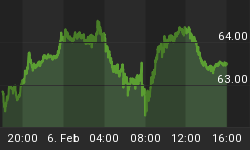Use Some Common Sense When Listening To Fed's Comments
"Members agreed that the statement to be released after the meeting should continue to convey that inflation risks remained the dominant concern and that additional policy firming was possible." - From Federal Reserve Minutes - October 24 & 25, 2006 Meeting
If you invest in stocks (SPY), gold (GLD), silver (SLV), bonds (SHY, TLT, IEF), or commodities (DBC), you may try to interpret Federal Reserve statements to garner some information about the direction of interest rates or the health of the economy. The Federal Reserve talks tough on inflation to manage public expectations. The Fed is well aware that (1) the economy is slowing, and (2) we have structural problems (large deficits, credit growth, etc.) that will keep inflation around for quite some time. Inflation should be tamer (at least the published numbers) in the coming months as the economy begins to weaken, but it is not going away in the longer-term (next 2 to 10 years). Actions speak louder than words - the Fed talks tough on inflation and yet is not raising rates with inflation running above their publicly stated comfort level. While the public feels the Fed is tightening credit by raising rates, credit has continued to expand, not contract, as the Fed raised interest rates numerous times since early 2004.

Imagine how the economy and markets would react if the Fed said, "The economy looks like it is headed toward a severe slowdown or a possible recession." They can't say that. Investors need to know how to differentiate between what the Fed says and what the Fed does. The odds are very high that the Fed is done raising rates, despite their tough talk. The odds are also well over 50% that the next move is a rate cut sometime as early as Q1 2007. The odds are almost 100% that at most we get one more hike before multiple cuts. The Fed is also well aware of the history of housing bubbles. Again, they cannot make public comments that the housing market most likely has a lot further to fall. Homebuyers would dry up almost instantly.
While the Fed has made some serious blunders in the past, they are well educated about the history of all markets. The real problem now is that they don't have much room to navigate with interest rates either way since rate cuts will contribute to more inflation, and rate hikes might really drive a nail in the housing market's coffin. As a result, I expect all interest rate cycles (both up and down) to be shorter in duration than the previous cycles. If and when they lower rates, they will have a very difficult time going as low as they did during the last reduction cycle.
Regardless of what happens in the short term, the long-term trends are for more credit creation (some call it "money printing") and more inflation. Sometime in the future, much like 1923 Germany, the credit bubble will pop and we will move into deflation, but we are nowhere near that point right now. Deflation (see Japan 1990s) would make all debts more burdensome throughout the entire economy, including Medicare and Social Security.
In the long run, the Fed will use every weapon they have to prevent deflation. We will most likely see hyperinflation sometime in the next 5 to 10 years, followed by deflation. Deflation will arrive after the velocity of money accelerates to record levels. Currently, the velocity of money is roughly where it was in 1994 - significantly below the levels seen in 2000. Deflation is coming and all the arguments for that are correct - they just have the timing wrong. More inflation, leading to hyperinflation, followed by deflation is the most likely outcome. That does not mean we will not have periods of deflation (we may be entering one now) in the secular inflationary trend.
Therefore, if the assertions above are correct, it means bonds (SHY,IEF,TLT) may be attractive in the next 18 months. However, in the long run, bonds appear very unappealing when compared to gold (GLD), silver (SLV), or commodities (DBC). U.S. stocks (SPY) may do well for a while longer, but are most likely in for a tough time when the economic numbers can no longer support the soft landing scenario. In the longer term, foreign stocks appear more attractive vs. U.S. stocks when you factor in the weak outlook for the U.S. dollar.
These articles exapand on these topics and provide some sound reasoning for the comments above:
Investing In Today's Inflationary World
What Can We Learn From 1923 Germany
The U.S. Dollar vs. Gold: You Should Care















